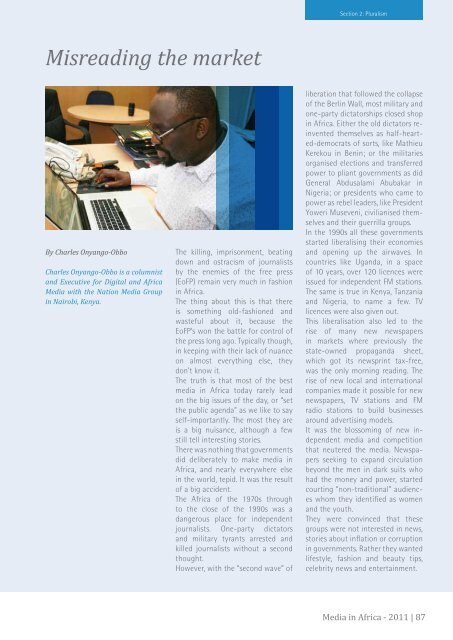Twenty years after the Windhoek Declaration on press freedom
Twenty years after the Windhoek Declaration on press freedom
Twenty years after the Windhoek Declaration on press freedom
Create successful ePaper yourself
Turn your PDF publications into a flip-book with our unique Google optimized e-Paper software.
Misreading <str<strong>on</strong>g>the</str<strong>on</strong>g> market<br />
By Charles Onyango-Obbo<br />
Charles Onyango-Obbo is a columnist<br />
and Executive for Digital and Africa<br />
Media with <str<strong>on</strong>g>the</str<strong>on</strong>g> Nati<strong>on</strong> Media Group<br />
in Nairobi, Kenya.<br />
The killing, impris<strong>on</strong>ment, beating<br />
down and ostracism of journalists<br />
by <str<strong>on</strong>g>the</str<strong>on</strong>g> enemies of <str<strong>on</strong>g>the</str<strong>on</strong>g> free <strong>press</strong><br />
(EoFP) remain very much in fashi<strong>on</strong><br />
in Africa.<br />
The thing about this is that <str<strong>on</strong>g>the</str<strong>on</strong>g>re<br />
is something old-fashi<strong>on</strong>ed and<br />
wasteful about it, because <str<strong>on</strong>g>the</str<strong>on</strong>g><br />
EoFP’s w<strong>on</strong> <str<strong>on</strong>g>the</str<strong>on</strong>g> battle for c<strong>on</strong>trol of<br />
<str<strong>on</strong>g>the</str<strong>on</strong>g> <strong>press</strong> l<strong>on</strong>g ago. Typically though,<br />
in keeping with <str<strong>on</strong>g>the</str<strong>on</strong>g>ir lack of nuance<br />
<strong>on</strong> almost everything else, <str<strong>on</strong>g>the</str<strong>on</strong>g>y<br />
d<strong>on</strong>’t know it.<br />
The truth is that most of <str<strong>on</strong>g>the</str<strong>on</strong>g> best<br />
media in Africa today rarely lead<br />
<strong>on</strong> <str<strong>on</strong>g>the</str<strong>on</strong>g> big issues of <str<strong>on</strong>g>the</str<strong>on</strong>g> day, or “set<br />
<str<strong>on</strong>g>the</str<strong>on</strong>g> public agenda” as we like to say<br />
self-importantly. The most <str<strong>on</strong>g>the</str<strong>on</strong>g>y are<br />
is a big nuisance, although a few<br />
still tell interesting stories.<br />
There was nothing that governments<br />
did deliberately to make media in<br />
Africa, and nearly everywhere else<br />
in <str<strong>on</strong>g>the</str<strong>on</strong>g> world, tepid. It was <str<strong>on</strong>g>the</str<strong>on</strong>g> result<br />
of a big accident.<br />
The Africa of <str<strong>on</strong>g>the</str<strong>on</strong>g> 1970s through<br />
to <str<strong>on</strong>g>the</str<strong>on</strong>g> close of <str<strong>on</strong>g>the</str<strong>on</strong>g> 1990s was a<br />
dangerous place for independent<br />
journalists. One-party dictators<br />
and military tyrants arrested and<br />
killed journalists without a sec<strong>on</strong>d<br />
thought.<br />
However, with <str<strong>on</strong>g>the</str<strong>on</strong>g> “sec<strong>on</strong>d wave” of<br />
Secti<strong>on</strong> 2: Pluralism<br />
liberati<strong>on</strong> that followed <str<strong>on</strong>g>the</str<strong>on</strong>g> collapse<br />
of <str<strong>on</strong>g>the</str<strong>on</strong>g> Berlin Wall, most military and<br />
<strong>on</strong>e-party dictatorships closed shop<br />
in Africa. Ei<str<strong>on</strong>g>the</str<strong>on</strong>g>r <str<strong>on</strong>g>the</str<strong>on</strong>g> old dictators reinvented<br />
<str<strong>on</strong>g>the</str<strong>on</strong>g>mselves as half-hearted-democrats<br />
of sorts, like Mathieu<br />
Kerekou in Benin; or <str<strong>on</strong>g>the</str<strong>on</strong>g> militaries<br />
organised electi<strong>on</strong>s and transferred<br />
power to pliant governments as did<br />
General Abdusalami Abubakar in<br />
Nigeria; or presidents who came to<br />
power as rebel leaders, like President<br />
Yoweri Museveni, civilianised <str<strong>on</strong>g>the</str<strong>on</strong>g>mselves<br />
and <str<strong>on</strong>g>the</str<strong>on</strong>g>ir guerrilla groups.<br />
In <str<strong>on</strong>g>the</str<strong>on</strong>g> 1990s all <str<strong>on</strong>g>the</str<strong>on</strong>g>se governments<br />
started liberalising <str<strong>on</strong>g>the</str<strong>on</strong>g>ir ec<strong>on</strong>omies<br />
and opening up <str<strong>on</strong>g>the</str<strong>on</strong>g> airwaves. In<br />
countries like Uganda, in a space<br />
of 10 <str<strong>on</strong>g>years</str<strong>on</strong>g>, over 120 licences were<br />
issued for independent FM stati<strong>on</strong>s.<br />
The same is true in Kenya, Tanzania<br />
and Nigeria, to name a few. TV<br />
licences were also given out.<br />
This liberalisati<strong>on</strong> also led to <str<strong>on</strong>g>the</str<strong>on</strong>g><br />
rise of many new newspapers<br />
in markets where previously <str<strong>on</strong>g>the</str<strong>on</strong>g><br />
state-owned propaganda sheet,<br />
which got its newsprint tax-free,<br />
was <str<strong>on</strong>g>the</str<strong>on</strong>g> <strong>on</strong>ly morning reading. The<br />
rise of new local and internati<strong>on</strong>al<br />
companies made it possible for new<br />
newspapers, TV stati<strong>on</strong>s and FM<br />
radio stati<strong>on</strong>s to build businesses<br />
around advertising models.<br />
It was <str<strong>on</strong>g>the</str<strong>on</strong>g> blossoming of new independent<br />
media and competiti<strong>on</strong><br />
that neutered <str<strong>on</strong>g>the</str<strong>on</strong>g> media. Newspapers<br />
seeking to expand circulati<strong>on</strong><br />
bey<strong>on</strong>d <str<strong>on</strong>g>the</str<strong>on</strong>g> men in dark suits who<br />
had <str<strong>on</strong>g>the</str<strong>on</strong>g> m<strong>on</strong>ey and power, started<br />
courting “n<strong>on</strong>-traditi<strong>on</strong>al” audiences<br />
whom <str<strong>on</strong>g>the</str<strong>on</strong>g>y identified as women<br />
and <str<strong>on</strong>g>the</str<strong>on</strong>g> youth.<br />
They were c<strong>on</strong>vinced that <str<strong>on</strong>g>the</str<strong>on</strong>g>se<br />
groups were not interested in news,<br />
stories about inflati<strong>on</strong> or corrupti<strong>on</strong><br />
in governments. Ra<str<strong>on</strong>g>the</str<strong>on</strong>g>r <str<strong>on</strong>g>the</str<strong>on</strong>g>y wanted<br />
lifestyle, fashi<strong>on</strong> and beauty tips,<br />
celebrity news and entertainment.<br />
Media in Africa - 2011 | 87












